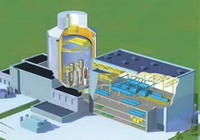-
Scrub carbon dioxide directly from the atmosphere too expensive
While it is possible chemically to scrub carbon dioxide from Earth’s atmosphere in order to lessen the severity of global warming, the process is prohibitively expensive for now; best to focus on controls for coal-burning power plants, say researchers
-
-
Improving pothole repairs
The alarming increase in the number of road potholes in the United Kingdom — an outcome of reduced road maintenance, increasing traffic volumes, heavier loads, and repeated adverse weather — is creating potentially hazardous driving conditions, causing serious concerns to the authorities as well as to the public; engineers are looking foe ways to improve pothole repairs
-
-
“Smart Connector” to detect, pinpoint damage to cellular cables

Researchers have developed the Smart Connector, a new sensor that once installed in the connecting units of coaxial cables can provide information about equipment damage and pinpoint the exact location through self-diagnosing technologies — some of the most advanced in the field today
-
-
The north of England can become the world’s nuclear base
Despite the repercussions from Fukushima, the nuclear new-construction renaissance continues in countries such as China, India, and the United Kingdom with sixty reactors under construction, 155 planned, and a further 338 proposed’ a new study suggests the that the north of England can become a hub for nuclear power-related activities
-
-
Study tracks safety of underground CO2 storage
An international team of geoscientists show that carbon dioxide can safely be stored underground in depleted natural gas fields; fhe experiment, in the Otway basin near Melbourne, Australia, is the most heavily monitored project for CO2 storage in the world
-
-
Small, modular reactors to figure in U.S. energy future
A newly released study concludes that small modular reactors (SMR) may hold the key to the future of U.S. nuclear power generation; an SMR would have a generating capacity of 600 megawatts or less, would be factory-built as modular components, and then shipped to their desired location for assembly
-
-
U.K. approves new reactor designs

U.K. regulators have given interim approval to two new nuclear reactor designs — the EDF and Areva’s UK EPRTM and Westinghouse’s AP1000; the regulators say that there are still some issues to be addressed, and that neither reactor can be built in the United Kingdom until these issues are resolved
-
-
Electrical grid needs cybersecurity oversight: study

In a recently released report, researchers from the Massachusetts Institute of Technology say that a single federal agency should be tasked with protecting the United States’ electrical grid from cyberattacks; the Obama administration has proposed that DHS assume responsibility for the grid, while Congress has submitted proposals for both the Department of Energy and the Federal Energy Regulatory Commission (FERC)
-
-
Scarce minerals, metals threaten manufacturing
The growing scarcity of certain minerals and metals is leading to explosive prices and delivery delays; since the relationships among these resources are strong, both the causes of and the solutions to scarcity are complex; for a manufacturing organization with a global supply chain, this can spell trouble
-
-
Changing bridge fabrication and inspection practices
As today’s engineers investigate the rebuilding of much of the nation’s infrastructure, a lot of which was constructed in the 1950s, they are using much improved materials and analysis tools; a Virginia Tech civil engineer predicts his new work on a fracture control plan for steel bridges promises to change bridge fabrication and inspection practices
-
-
Shale gas development and healthy water sources
Geological formation known as the Marcellus Shale contains gas reservoir holding nearly 500 trillion cubic feet of technically recoverable gas; at current use rates, that volume could meet the U.S. demand for natural gas for more than twenty years; trouble is, extracting shale gas involves considerable pollution risks for water; Pennsylvania has more miles of stream per unit land area than any other state in the United States – and it is concerned about the quality of its water if more shale gas is extracted
-
-
MIT report warns U.S. electrical grid vulnerable
A new report from the Massachusetts Institute of Technology warns that the U.S. electrical grid is vulnerable to cyberatacks; according to the report, the U.S. electrical grid’s cybersecurity vulnerabilities stem from weaknesses in processes, technology, as well as the actual physical environment
-
-
Shell fears cyberattack on oil infrastructure
Oil executives fear that a cyberattack on critical infrastructure could wreak havoc by destroying facilities or disrupting production
-
-
Decontaminating radiation-laced water at Fukushima Daiichi
Thanks to special radiation devices, made by UOP LLC, a Honeywell company, cleanup crews in Japan have been able to treat five million gallons of water contaminated by radiation at the Fukushima Daiichi nuclear power plant
-
-
SCADA systems’ vulnerability key weakness in Smart Grid deployments
The discovery of the Stuxnet worm in 2010 shone a harsh light on the fragility of industrial control systems (ICS), such as supervisory control and data acquisition (SCADA) systems, and has created a new urgency among security vendors and utility managers alike; new research forecasts that investments in ICS security will total $4.1 billion during the years between 2011 and 2018
-
More headlines
The long view
Water Wars: A Historic Agreement Between Mexico and US Is Ramping Up Border Tension
As climate change drives rising temperatures and changes in rainfall, Mexico and the US are in the middle of a conflict over water, putting an additional strain on their relationship. Partly due to constant droughts, Mexico has struggled to maintain its water deliveries for much of the last 25 years, deliveries to which it is obligated by a 1944 water-sharing agreement between the two countries.
Trump Is Fast-Tracking New Coal Mines — Even When They Don’t Make Economic Sense
In Appalachian Tennessee, mines shut down and couldn’t pay their debts. Now a new one is opening under the guise of an “energy emergency.”
Smaller Nuclear Reactors Spark Renewed Interest in a Once-Shunned Energy Source
In the past two years, half the states have taken action to promote nuclear power, from creating nuclear task forces to integrating nuclear into long-term energy plans.
Keeping the Lights on with Nuclear Waste: Radiochemistry Transforms Nuclear Waste into Strategic Materials
How UNLV radiochemistry is pioneering the future of energy in the Southwest by salvaging strategic materials from nuclear dumps –and making it safe.
Model Predicts Long-Term Effects of Nuclear Waste on Underground Disposal Systems
The simulations matched results from an underground lab experiment in Switzerland, suggesting modeling could be used to validate the safety of nuclear disposal sites.
